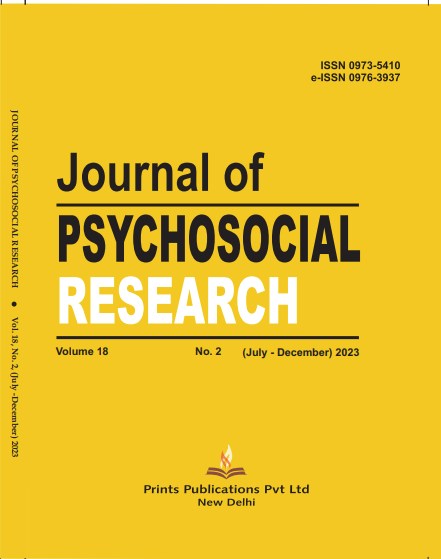Journal of Psychosocial Research
Current Volume: 20 (2025 )
ISSN: 0973-5410
e-ISSN: 0976-3937
Periodicity: Half-Yearly
Month(s) of Publication: June & December
Subject: Psychology
DOI: 10.32381/JPR
Perceived Caste Discrimination, Self Esteem and Self Determination among college students belonging to Scheduled Castes
By : Swati Agarwal, Moola Priyanka
Page No: 147-158
Abstract
Discrimination is defined as the unjust and prejudicial treatment of different categories of people based on the group, class or category to which that person belongs. Self-esteem refers to a favourable or unfavourable attitude toward the self. Self determination is when individuals experience one of two forms of motivation: autonomous or controlled. Autonomous motivation is when people experience a profound sense of choice. In contrast, when individuals experience controlled motivation, they feel obliged and driven by forces that transcend the self. The present study is a quantitative study with a between groups design to observe if there is a difference between female students and male students belonging to the scheduled castes with respect to perceived caste discrimination, self esteem and self determination and its two dimensions (viz., self-contact and choicefulness). It also adopts a correlational design to study the relationship between perceived caste discrimination, self esteem and self determination and its two dimensions. Through purposive sampling, data was collected from 200 college students belonging to the scheduled castes. Brief Perceived Ethnic Discrimination Questionnaire-Community Version, Rosenberg’s Self-esteem Scale and Self Determination Scale were used. Results of independent samples t-test indicated a significant difference between female and male students, with respect to perceived caste discrimination. Pearson’s correlation revealed a significant positive relationship between perceived caste discrimination and self-esteem in female students and a significant negative relationship between perceived caste discrimination and self-contact (dimension of self-determination) in both female and male students. In male students, a significant positive relationship between perceived caste discrimination and choicefulness (dimension of self-determination) was also found. In light of the current tumultuous environment in universities across India with regard to the issue of caste discrimination, the findings of the present study highlights the association of perceived caste discrimination with psychological factors which can be used for various interventions in educational institutions.
Authors :
Swati Agarwal : Assistant Professor, St. Francis College for Women, Begumpet, Hyderabad.
Moola Priyanka : Lecturer — St. Pious X Degree & PG College for Women, Nacharam, Hyderabad.





